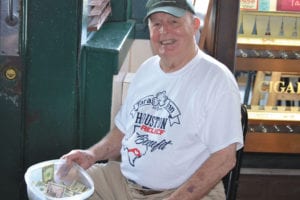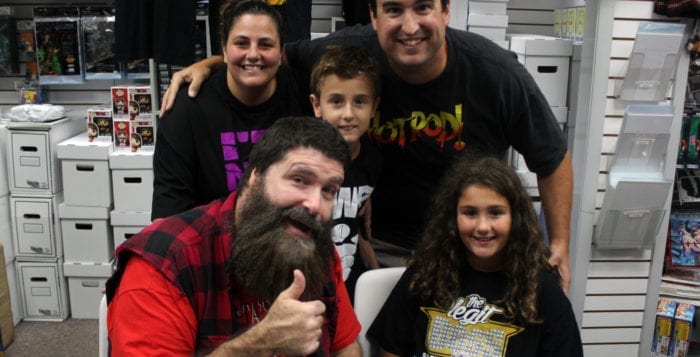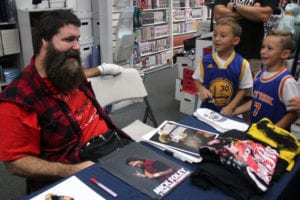 Welcome to the 33rd edition of Paw Prints, a monthly column for animal lovers dedicated to helping shelter pets find their furever home.
Welcome to the 33rd edition of Paw Prints, a monthly column for animal lovers dedicated to helping shelter pets find their furever home.

Meet Beetlejuice, Lydia and Delia
These sweet babies at the Smithtown Animal Shelter are just 5 months old and ready for their furever home. Curious and playful, they can’t wait to get out of their cage and explore the world. They are spayed/neutered and up to date on their vaccinations. The shelter has a surplus of adorable furballs waiting for their heroes. Come visit them today! 631-360-7575.

Meet Gizmo
Waiting patiently at the Brookhaven Animal Shelter, this little guy is Gizmo, a spirited 10-year-old with a heart full of zest and a personality that’s anything but old! Despite his years, Gizmo is brimming with energy and loves to take charge of bird and squirrel duty in the yard. When he’s not on patrol, you’ll find him happily curled up in your lap, basking in the sun, or enjoying a leisurely walk.
Gizmo does have a few quirks—he prefers not to have his back end touched and might show a little attitude if it happens (just a hint of spice!). He also has a cherry eye, but don’t let that fool you; it doesn’t impact his vision one bit. Gizmo would thrive in a home with a low-key canine companion to share his golden years and would do best with children aged 12 and up. He is neutered, vaccinated, and heartworm negative. If you’re looking for a loving lap companion with a playful side, Gizmo is ready to bring joy and warmth to your home!
Please fill out a Matchmaker Adoption Application at www.brookhavenny.gov/152/Animal-Shelter to arrange a meet and greet

Meet Houston
Filled with sage advice and words of wisdom, meet Houston, a thirteen-year-old Beagle mix at Little Shelter in Huntington. While part of the “Silver Sneakers” set, this distinguished gentleman routinely logs in more steps than his kennel mates, knowing that keeping active and engaged is the key to staying youthful. Looking towards the future with a positive attitude, he’s confident that he has much to contribute as your best friend and companion, in addition to being an expert commentator on the upcoming Puppy Bowl!
If you have room on your couch and a good supply of snacks, stop by Little Shelter to meet Houston…he’s the one appropriately dressed in the Superman t-shirt!
“The dog’s tail wagged. It was his tail’s job; to synchronize all nearby moods to the measure of his joy. A metronome of happiness.” 631-368-8770, ext. 21

Meet Gizzy
Thriving on tenderness, appreciation, encouragement, and butt scratches, meet Gizzy, a ten year old Shih-tzu mix at Little Shelter in Huntington. An impartial judge of character, once you earn her trust you’ll find her to be warm, affectionate and good-hearted. A girly girl, she loves to dress the part and prance down the walking path (aka runway!) showing off her impeccable style. Despite being visually challenged, she’s fiercely independent, enjoying exploratory walks guided by her other senses and the sound of your voice.
With a resilient spirit and the soul of a warrior, Gizzy has proven she can handle anything life throws her way. Now she’s ready for the challenging task of screening potential adopters to find her forever home, confident she’ll have her happily ever after. You’ll want to be first in line to meet this little force of nature…ask for Gizzy! 631-368-8770, ext. 21


Meet Elvira and Spider
Kent Animal Shelter in Calverton has a bumper crop of kittens available for adoption including, from left, Elvira, a beautiful 6-month-old female, and Spider, a 4 1/2-month-old male. Come find your new best friend! 631-727-5731
TEACHER’S PET MONTH
 Did you know? For the month of September, the Town of Brookhaven Animal Shelter, 300 Horseblock Road, Brookhaven offers a “Teacher’s Pet” special promotion — All animals that are ” School Age” (4 years old and up) are free. 631-451-695
Did you know? For the month of September, the Town of Brookhaven Animal Shelter, 300 Horseblock Road, Brookhaven offers a “Teacher’s Pet” special promotion — All animals that are ” School Age” (4 years old and up) are free. 631-451-695
Rescue is a lifestyle. Adopt, don’t shop.
Check out the next Paw Prints in the issue of October 17.
Paw Prints is generously sponsored by Mark T. Freeley, Esq.











